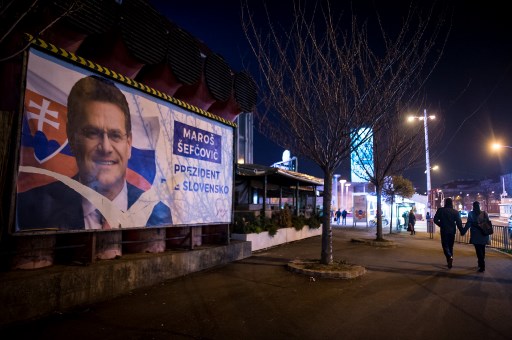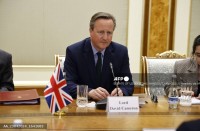
BRATISLAVA, Slovakia (AFP) – Maros Sefcovic, the ruling party’s candidate in Saturday’s Slovak presidential run-off against a government critic, is a long-time EU commissioner and career diplomat with a passion for sports.
Though running as an independent, the 52-year-old European Commission vice-president has the backing of the governing populist Smer-SD party, which may have cost him first place in round one.
Support for the three-party governing coalition took a hit last year after journalist Jan Kuciak — who was investigating high-level political corruption — and his fiancee were gunned down.
Kuciak had been about to publish a report on the alleged ties between politicians of Smer-SD and the Italian mafia and associated irregularities in EU farm subsidy payments.
His murder and last explosive report, published posthumously, plunged the country into crisis, raising concerns about media freedom and corruption and prompting tens of thousands of anti-government protesters to take to the streets.
Robert Fico was forced to resign as prime minister but remains the Smer-SD leader and is a close ally of current premier Peter Pellegrini.
This puts Sefcovic in a tight spot.
“He cannot stand on the side of those who support democratisation because he has the support of those who caused these problems,” Bratislava-based analyst Grigorij Meseznikov told AFP.
Fateful gift
Sefcovic had ruled out running for president last year in this country of 5.4 million people but agreed to run in January after Foreign Minister Miroslav Lajcak turned down Smer-SD’s offer.
“With my candidacy, I want to pay my country back for what it gave me,” he said in a televised debate.
Born and raised in one of Bratislava’s concrete flats, Sefcovic was 12 when his father gave him a book on diplomacy for Christmas.
“It was with excitement that I read about how Lord Essex travelled around Afghanistan to deal with the local crises,” Sefcovic recalls on his website.
He went on to study at the University of Economics in Bratislava and the Moscow State Institute of International Relations.
A former member of the Communist party, he has said that Russia “is not a threat. Russia is a strategic challenge.”
He has held several diplomatic posts and served as the Slovak ambassador to Israel. He speaks fluent English, French and Russian and also understands German.
A European Commission member since 2009 and a vice-president since 2014, Sefcovic is pro-Europe but believes Slovakia must retain some decision-making powers.
“We need to be able to decide what kinds of taxes we pay, or who’ll be invited to Slovakia when it comes to migration,” he told local media.
Though an experienced politician, Sefcovic is relatively unknown at home and “has little insight into domestic politics,” according to political analyst Juraj Marusiak.
Sports diplomacy
A father of three, Sefcovic’s campaign pledges included greater social benefits for the elderly and young families, a stronger industrial policy and revitalisation of the country’s agricultural sector.
Known for his radiant smile, Sefcovic has recently appeared in a social media meme with the caption “PresiDENT”.
Mad about sports, he ran track as a teenager and played volleyball in college.
Last year, he climbed the 2,520-metre (8,268-foot) Tazky peak in Slovakia’s High Tatra mountains and has posted photos of himself white water rafting.
“I still spend 90 percent of my free time doing sports, nowadays it is mostly tennis, fitness, cycling and skiing,” he said in an interview.
Sport even creeps into his plans for the nation.
“I want to see Slovakia continue playing in the European Champions League when it comes to the EU,” he said earlier this month.







